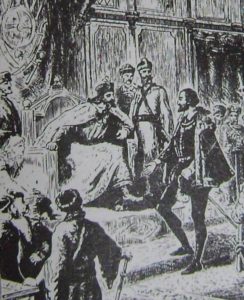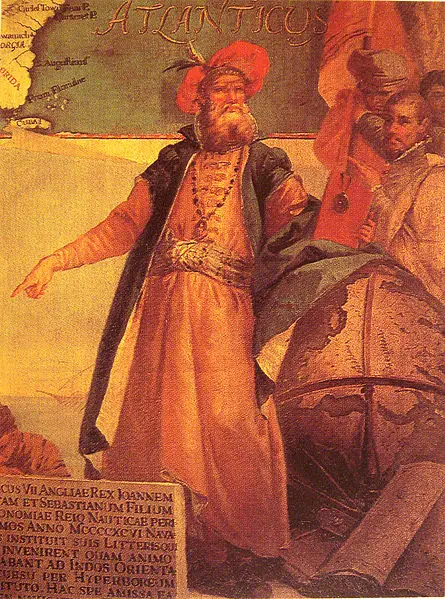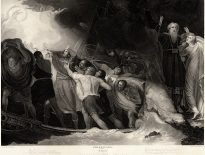 Richard Chancellor is a Tudor explorer famous for his interactions with Russia. His origins and childhood are mostly unknown, and as such, there is a lot of speculation. We believe he was born in 1521 and lived near Bristol. It is claimed that he was raised by Sir Henry Sidney, Lord Deputy of Ireland.
Richard Chancellor is a Tudor explorer famous for his interactions with Russia. His origins and childhood are mostly unknown, and as such, there is a lot of speculation. We believe he was born in 1521 and lived near Bristol. It is claimed that he was raised by Sir Henry Sidney, Lord Deputy of Ireland.
In the 1550s, Chancellor sailed with Roger Bodenham as an apprentice pilot in the voyage of the Bark Aucher to the Levant. This trip was intended to provide English mariners with the experience of longer voyages, something that they were less experienced in than their French and Spanish counterparts. By 1553, English markets were becoming more diverse, and there was increased demand for cloth from the Far East. As such, merchants, courtiers, and noblemen funded an expedition to the East, which consisted of three ships – the Bona Esperanza, Edward Bonaventure, and the Bona Confidentia. Richard Chancellor was appointed as the pilot general of the voyage and as captain of the Edward Bonaventure, the largest ship in the expedition. The voyage departed on 22nd May 1553 but was delayed for several weeks in Harwich due to faulty casking. Eventually, they set sail on 23rd June, and the ships progressed towards the Norwegian coast. The leaders of the expedition agreed to meet at Vardö should they become separated; however, they were all scattered by a vicious storm. Chancellor arrived at the town and waited seven days for the others to come, but no one did. Richard set sail from Vardö and arrived at the Russian port town of St Nicholas towards the end of August 1553.
The inhabitants of the town were cautiously friendly towards Chancellor and his crew, allowing them to dock and rest there. Chancellor decided he would travel to the court of the Tsar instead of sailing east, finally reaching Moscow in the winter of 1553-4. He had written to the Tsar to warn him of his arrival and was met by emissaries when coming into the city. The content of Chancellors negotiations with the emissaries can be found in a letter written to Edward VI that discusses the Russians freeing their markets for trade and allowing English merchants to trade freely on Russian soil. The Tsar agreed to the terms put forward by his emissaries, and this is believed to be the beginning of Anglo-Russian relationships. Richard Chancellor returned to England later in 1554.
In May 1555, Richard Chancellor commanded the first expedition of the Russia Company and returned to Muscovy with two ships; the Philip and Mary and the Edward Bonaventure. He carried merchants’ factors and letters of privilege to be ratified by the Tsar. Richard stayed in Moscow over the winter, and the following year he led an expedition to retrieve and repatriate the Bona Esperanza and Bona Confidentia, which had been found wrecked with the crew dead. The expedition was also to carry the Tsar’s embassy to England.
They departed from St Nicholas in July 1556, and only one ship returned safely to England. The Edward Bonaventura, which carried Chancellor and the Russian ambassador, reached Scotland but was wrecked in Pitsligo Bay on the coast of Aberdeen on 10th November 1556. The Russian ambassador later recounted that his own life was saved by Chancellor, who drowned while trying to carry the ambassador to shore. The legacy of Richard Chancellor exists mainly due to the observations of Muscovy that he gave to his friend Clement Adams when he returned to England in 1554, and in his own book which briefly relays his audience with the Tsar. In this book, descriptions of cities such as Moscow, Novgorod, Yaroslavl can be found, with rivers Volga, Ob, Don, and Dnieper named. Chancellor also recorded life at the Tsar’s court and its rituals and customs, providing an invaluable insight into court etiquette for subsequent English merchants. Chancellor’s notes were not made public until 1589 when Hakluyt produced them in his edition of Principall Navigations.
Details of Chancellor’s personal life are almost non-existent. There are only two references to family, one being his friend Clement Adams reporting Chancellor’s anxiety that death at sea would make orphans of his two sons; and an uncle to whom he dedicated his book. We do know that one of Chancellor’s sons became an employee of the Russia Company and served in three voyages to Baffin Island. Nicholas Chancellor died in 1582 of a fever. Although we have few sources for the life of Richard Chancellor, his experience in Russia and with the Russian Tsar provide invaluable insight into early Anglo-Russian relationships.
by Georgia Whitehead
Georgia has just finished her masters in Classics at the University of Edinburgh. Academically, Georgia is interested in early Christianity, with her master's thesis focusing on "The Male Gaze and Self-Representation in Female Christian Narratives". In addition to her interest in ancient history, she has always been an avid lover of the Tudor era, drawn to the magnificence of the Tudor courts and the larger than life characters. She is particularly interested in The Reformation, Christianity and the shifting sands of ecclesiastical politics in this period and also has a keen interest in the lives of Tudor women. It is Georgia's ambition to become a writer, perhaps publishing her own Tudor novel one day.
Georgia also runs a history blog and instagram page called Historia Mundis.
Bibliography
- Evans, J (2014). Tudor Adventurers: An Arctic Voyage of Discovery. New York: Pegasus Books.
- McDermott, J (2004). "Chancellor, Richard (d. 1556)". Oxford Dictionary of National Biography. Oxford University Press.
- R. Hakluyt, The principal navigations, voyages, traffiques and discoveries of the English nation



Leave a Reply